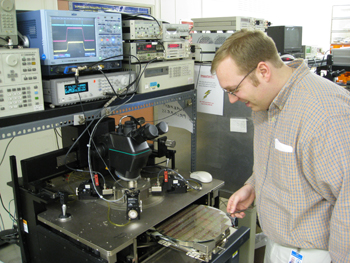| * |
|
CMOS Device and Reliability
Summary:The CMOS Device and Reliability Project will develop advanced metrology tools to enable high performance CMOS devices with sufficient reliability. CMOS (Complementary Metal Oxide Semiconductor) technology is part of the basic competency of our industrial country. CMOS devices are the fundamental building blocks of nearly every electronic system found in modern society. The continued development of CMOS enables or improves almost all advanced technologies. While CMOS technology advances at a rapid pace, it is extremely complex. This project develops methods to characterize new CMOS devices and ensure their reliability for a wide range of applications. In doing this, we are able to help U.S. companies compete successfully in this vital industry. Description:Electron devices and their reliability have long been important topics of research at NIST. Over the years, we have always played a central role in this important field. Many of the commonly used test structures and test methodologies in the industry were developed at NIST. NIST also led many of the standard setting efforts. Major Accomplishments:
|
 Loading 12” wafer containing state-of-the-art CMOS devices into a probe station in preparation of making high-speed measurements of transient changes in device characteristics due to temperature-bias stress. End Date:on-goingLead Organizational Unit:pmlStaff:Kin (Charles) P. Cheung, Leader Contact
Charles Cheung 100 Bureau Drive, M/S 8120 |
